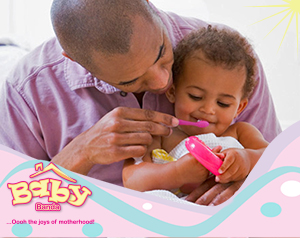Baby’s first teeth generally appear any time from around 5 months and 27 months and need to be kept healthy to allow your baby to eat, speak and have healthy permanent teeth later. In our culture, not much care is taken for our baby’s teeth leading to cavities and poor oral health.
Teething problems
During teething, most babies and toddlers may experience teething problems such as:
- red, swollen gums
- irritability and restlessness
- Mild fever
- Dribbling
- Finger and fist-sucking.
You can ease teething pain by letting your baby chew on objects such as crusts of bread, raw carrots or teething rings. Rubbing your child’s gums with your finger or applying a small amount of teething gel may also help to ease teething pain. Talk to your doctor if your baby develops a fever or diarrhoea.
Tips for taking care of the teeth to prevent infant tooth decay
- Breastfeed your baby. Breast milk is best for your baby and helps with proper nutrients for teeth formation.
- Avoid juices and sweet drinks. The best drinks for your baby are breast milk, formula or water.
- Do not put your baby to bed with a bottle containing anything other than water.
- As soon as your baby’s teeth appear, brush them with a child-sized, soft toothbrush.
- Ensure all family members have good oral health as anyone, including the mother, can pass the bacteria that cause tooth decay on to a baby through sharing spoons or cleaning a pacifier or bottle in their own mouth.
- Try introducing a cup from about six months of age and try to stop bottle use from about 12 months of age.
Brushing the teeth
- As soon as your baby’s teeth appear, brush the teeth with a child-sized, soft toothbrush. Clean their teeth daily because plaque (a sticky, invisible film of bacteria and left-over food) will form in your baby’s mouth just as it does in your own.
- Brush your baby’s teeth with a small, pea-sized amount of low fluoride toothpaste after your baby turns six months. Please use only low fluoride toothpaste created especially for children under six years of age. They are available in most supermarkets or pharmacies.
- Children only require a small amount of fluoride toothpaste and should not be allowed to use toothpaste without supervision. Toothpaste should be kept out of reach of children.
- Parents should assist with the brushing of teeth until children are about eight years of age.













